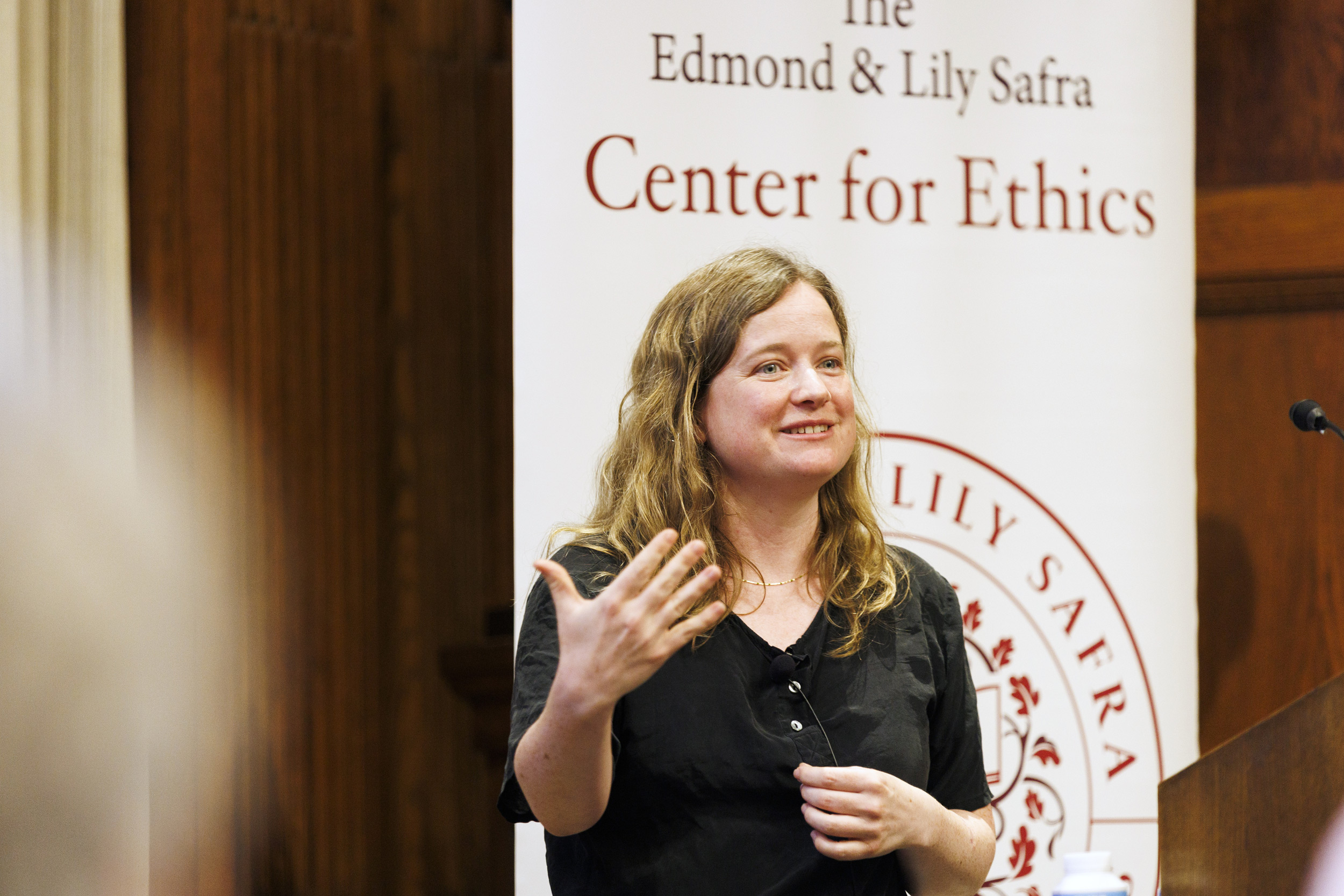The act of taking offense signals neither vulnerability nor sensitivity, according to Emily McTernan, an associate professor in political philosophy at University College London. Instead, she says, it’s an important tool for protecting status and enforcing social norms.
McTernan focused on this distinction in a talk titled “On Taking and Giving Offense” Thursday at the Barker Center. The event was sponsored by the Edmond and Lily Safra Center for Ethics.
McTernan started her lecture with the story of a professor who made a joke at the World Conference for Science Journalists in South Korea. “Let me tell you my trouble with girls,” he began. “You fall in love with them, they fall in love with you. And when you criticize them, they cry.”
“Perhaps, unsurprisingly,” said McTernan, who published “On Taking Offence” last year, “his joke caused offense and hit social media with widespread condemnation.”
It also followed a familiar pattern.
“There’s been a misconception of what free speech is. You have no right to a receptive audience. To take offense is not to stop conversation; it’s a move in the conversation.”
“Someone says something that offends, the offending remark goes viral, causing offense well beyond its original audience,” said McTernan. The culprit apologizes, explaining that the remark was thoughtless or misinterpreted. Others come to the offender’s defense, and so on.
In a world where these incidents seem increasingly common, McTernan posed the question: “What exactly is to take offense? What’s going on with these apologies and recriminations?”
Too often, she argued, the reaction of the offended person is dismissed as “hurt feelings.” In some cases, taking offense is seen as stifling free speech.
Both responses, she said, fall short of the truth. Instead, the offended party experiences “someone ignoring or mistaking [their] standing or dismissing and attacking it.”
This is a departure from what little philosophical work there is on taking offense, in which it is defined as a reaction of disgust or annoyance, McTernan said. Her approach has more in common with the ideas of sociologist Erving Goffman, who argued that status is formed in part through social interactions and that it can always change.
“This standing is up for negotiation,” McTernan said. “I present myself in a certain way,” and that is either accepted or rejected by the other people in the interaction. “If I attack, dismiss, or fail to recognize some aspect of yourself that you take to have value, that can be a threat to the way you want to represent yourself.”
This definition clarifies why we can take “such profound offense” at personal attacks, she said, particularly about “moral commitments, career, or religion.”
Describing herself as “not a fan” of public shaming, McTernan acknowledged that taking offense acts as a “social sanction.”
“It’s terribly effective at shaping what we can and cannot say.”
Still, she argued, taking offense is not censorship, even when it includes making your reaction public. “There’s been a misconception of what free speech is,” McTernan said. “You have no right to a receptive audience. To take offense is not to stop conversation; it’s a move in the conversation.”
There are exceptions and nuances, she noted. “There is a threat to free speech when institutions and employers weigh in. The risk of losing your job is a very strong social pressure.”
McTernan also examined apologies, including the ways a bad one can exacerbate harm. One such misstep is the apology that insists the effect was unintended. Because giving offense is an affront to standing, she said, trying to say that the affront was not intended only makes matters worse. It reveals the joker’s lack of understanding. It pushes blame onto the listener. A good apology, on the other hand, takes full responsibility for a joke’s insensitivity.
During the Q&A portion of the event, McTernan was asked if the act of taking offense is a way to claim social power.
“Absolutely,” she responded. “If you are very powerful it is very easy for you to signal offense and get uptake for it. The raised eyebrow of the eminent professor is going to do a lot of work, whereas the student might need to signal offense more virulently.”
She added: “The only thing I want to resist is the thought that if you’re not at the top of the pecking order you have no power. Because of the nature of our self-representation, the fragility of the ways we present each other, the vulnerabilities to nicks to our self-image, it gives everyone a bit of power to take offense and to have it be effective.”
Source link

